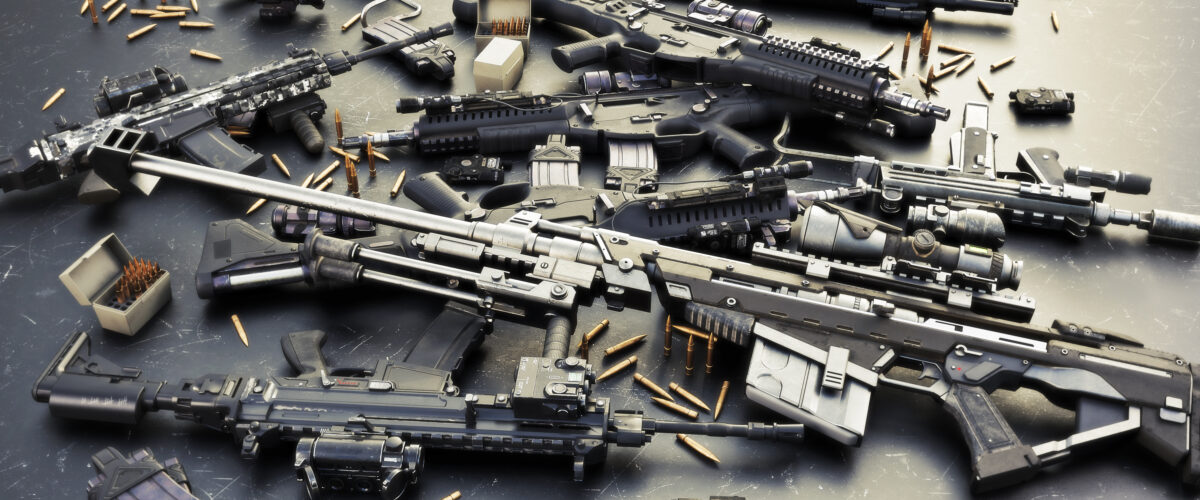Introduction
Rifles are among the most popular and versatile firearms, used for a range of activities from hunting and sport shooting to self-defense and military applications. Understanding the different types of rifles and their specific features can help you choose the right one for your needs. This guide will explore the various types of rifles, their characteristics, and their best uses, providing you with a comprehensive understanding of these powerful firearms.
The Basics of Rifles
What is a Rifle?
A rifle is a long-barreled firearm designed for precision shooting. Unlike other firearms, rifles have rifled barrels, which means the barrel has grooves (rifling) that cause the bullet to spin, increasing accuracy and stability.
Rifle Components
- Barrel: The long metal tube through which the bullet travels.
- Stock: The part of the rifle that rests against the shoulder.
- Action: The mechanism for loading, firing, and unloading the rifle.
- Magazine: A device that holds and feeds ammunition into the action.
- Sights/Scopes: Tools for aiming the rifle.
Bolt-Action Rifles
Characteristics of Bolt-Action Rifles
Bolt-action rifles are known for their reliability and accuracy. The action is manually operated by opening and closing the bolt, which ejects the spent cartridge and chambers a new one.
Popular Uses
- Hunting: Ideal for large game hunting due to their accuracy and power.
- Sport Shooting: Preferred for precision shooting competitions.
Examples
- Remington 700: A widely-used bolt-action rifle known for its accuracy and customization options.
- Winchester Model 70: Often called the “Rifleman’s Rifle,” renowned for its quality and performance.
Semi-Automatic Rifles
Characteristics of Semi-Automatic Rifles
Semi-automatic rifles automatically cycle the action to chamber the next round after each shot, allowing for faster follow-up shots without manual operation.
Popular Uses
- Tactical and Defense: Used by military and law enforcement for rapid fire capabilities.
- Sport Shooting: Popular in competitive shooting sports.
Examples
- AR-15: One of the most popular semi-automatic rifles, known for its versatility and modular design.
- Ruger 10/22: A favorite for small game hunting and target shooting, known for its reliability and ease of use.
Lever-Action Rifles
Characteristics of Lever-Action Rifles
Lever-action rifles feature a lever that cycles the action, ejecting the spent cartridge and chambering a new one. They are known for their historical significance and rapid firing capability.
Popular Uses
- Hunting: Suitable for medium game hunting and brush hunting.
- Historical Reenactments: Favored by enthusiasts of Western history.
Examples
- Winchester Model 1894: An iconic lever-action rifle, famous for its use in the American West.
- Marlin 336: Known for its ruggedness and reliability, popular among hunters.
Pump-Action Rifles
Characteristics of Pump-Action Rifles
Pump-action rifles, also known as slide-action rifles, require the shooter to manually cycle the action by pulling a fore-end pump handle. This action ejects the spent cartridge and chambers a new one.
Popular Uses
- Hunting: Particularly effective for hunting in dense cover.
- Small Game Hunting: Often used for hunting small game and varmints.
Examples
- Remington 7600: A versatile pump-action rifle used for hunting various game.
- Henry Pump Action Octagon: Known for its classic design and smooth operation.
Break-Action and Single-Shot Rifles
Characteristics of Break-Action and Single-Shot Rifles
Break-action rifles open at the breech, allowing a single cartridge to be inserted and fired. Single-shot rifles must be manually reloaded after each shot.
Popular Uses
- Target Shooting: Often used in precision target shooting due to their simplicity and accuracy.
- Hunting: Suitable for hunting where single, precise shots are necessary.
Examples
- Thompson Center Encore: A versatile break-action rifle that can be configured for various calibers and uses.
- Ruger No. 1: A single-shot rifle known for its accuracy and craftsmanship.
Tactical Rifles
Characteristics of Tactical Rifles
Tactical rifles are designed for military and law enforcement use, featuring advanced optics, accessories, and modular components for various tactical applications.
Popular Uses
- Law Enforcement: Used for tactical operations and rapid response scenarios.
- Military: Standard issue for many armed forces around the world.
Examples
- FN SCAR: A modular rifle used by special forces, known for its reliability and versatility.
- Heckler & Koch G36: A German-made tactical rifle favored by many military units.
Hunting Rifles
Characteristics of Hunting Rifles
Hunting rifles are designed specifically for taking down game animals, offering a balance of power, accuracy, and portability.
Popular Uses
- Big Game Hunting: Used for hunting large animals such as deer, elk, and bear.
- Small Game Hunting: Suitable for hunting smaller animals like rabbits and birds.
Examples
- Savage 110: A highly accurate and customizable rifle, popular among big game hunters.
- Browning X-Bolt: Known for its precision and high-quality build, favored by many hunters.
Scout Rifles
Characteristics of Scout Rifles
Scout rifles are lightweight, versatile rifles designed for general-purpose use, combining features from various types of rifles.
Popular Uses
- Survival: Ideal for survival situations due to their versatility and ease of use.
- Hunting: Suitable for hunting a variety of game.
Examples
- Steyr Scout: Designed by Jeff Cooper, known for its compact design and practicality.
- Ruger Gunsite Scout: A modern scout rifle that balances portability with performance.
Precision Rifles
Characteristics of Precision Rifles
Precision rifles are built for extreme accuracy at long ranges, featuring heavy barrels, advanced optics, and adjustable components.
Popular Uses
- Long-Range Shooting: Used in competitions and by snipers for hitting targets at long distances.
- Hunting: Suitable for hunting in open terrains where long-range shots are necessary.
Examples
- Accuracy International AX50: A high-end precision rifle used by military snipers.
- Bergara B-14 HMR: Known for its precision and reliability, popular among competitive shooters.
Conclusion
Understanding the different types of rifles and their specific uses is essential for choosing the right firearm for your needs. Whether you are interested in hunting, sport shooting, self-defense, or tactical applications, there is a rifle designed to meet your requirements. By exploring the characteristics and popular uses of each type, you can make an informed decision and enjoy the full benefits of responsible rifle ownership.
FAQs
What is the difference between a bolt-action and a semi-automatic rifle?
Bolt-action rifles require manual operation to cycle the action, while semi-automatic rifles automatically cycle the action, allowing for faster follow-up shots.
What are lever-action rifles commonly used for?
Lever-action rifles are commonly used for hunting medium game and for historical reenactments due to their rapid firing capability and historical significance.
Can pump-action rifles be used for hunting?
Yes, pump-action rifles are effective for hunting, particularly in dense cover and for small game hunting.
What makes a scout rifle versatile?
Scout rifles are designed to be lightweight, easy to use, and adaptable for various purposes, making them suitable for survival, hunting, and general-purpose use.
Why are precision rifles used for long-range shooting?
Precision rifles are built for extreme accuracy with features like heavy barrels, advanced optics, and adjustable components, making them ideal for hitting targets at long distances.
Are tactical rifles only for military and law enforcement use?
While tactical rifles are designed for military and law enforcement, they are also used by civilians for tactical training, self-defense, and sport shooting.

